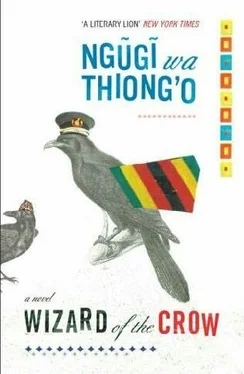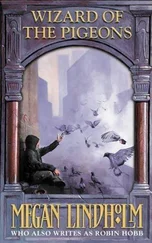Wangahü’s wealth came from timber, coffee, and tea. He had three children, two boys and the girl Nyawlra. The boys did not do particularly well in Aburlrian schools, and Wangahü sent them off to America, where they enrolled in colleges to study accounting and computer science, or so they claimed. They wandered from college to college without graduating, but every year Wangahü sent them money for tuition and room and board. Although as a parent he was concerned about their lack of progress, as a man of means he had something that would boost his already considerable standing among his peers: to pay full tuition and room and board for two in America was no easy task, and he was showing that he was indeed a man of some financial clout. He did not send Nyawlra to America, for he did not want his daughter to marry white, though he had no such reservations for the boys. Even so, he wanted her to have a lifestyle commensurate with his class. The rich bought their sons and daughters cars jokingly referred to as toys, Japanese in contrast to all German makes, which were of course for grown men and women. Nyawlra’s was a brand-new Toyota Corolla, and early on she bought into the lifestyle. Parties, keeping up with the latest fashion, speeding on the highways, these were the chief joys of her life, and she had not stopped to look under the surface of things. In those days, the likes of Yunity Mgeuzi-Bila-Shaka and Luminous Karamu-Mbu-ya-Itulka were often in the news, being denounced by the Ruler for preaching revolution. She hated the very mention of these rebels: Why were they so critical of the government? And why were they in exile?
Then there was this accident. She was driving on a highway, fascinated with speed, pushing her car to its limit when it skidded and crashed on the roadside. Though she suffered minor injuries, she knew that she had narrowly escaped. What surprised her then and later when she recalled her near fatality was the number of cars that simply passed her by; no one had stopped to see if anyone was hurt or needed help. The people who hurried to her rescue were the barefooted, mostly. One unloaded his donkey cart to rush her to the nearest medical center many miles away, the donkey announcing their arrival at the emergency room by braying loudly and shitting.
During the period of recovery she learned how to play guitar. At first it was hard pressing the strings and putting the chords together, but when she started strumming and producing music, it was strangely soothing. The music contributed to her healing. It was then that she started thinking seriously about her life. If she had died, what would she have left behind as her legacy to the living? There had to be more to life than fast cars, parties, and beauty parlors. She was in her first year at Eldares University, and from then on she started taking an interest in social issues. She became active in theater and student politics and acquainted herself with the activities in exile of Yunity Mgeuzi-Bila-Shaka and Luminous Karamu-Mbu-ya-Itulka, who inspired her teenage imagination. She also loved the stage, and nothing made her happier than playing this or that tragic or comic role, eliciting tears or laughter from an audience. She was a brilliant actress. She could change herself into any character, sometimes so realistically that even those who thought they knew her well because of seeing her on the platforms in many student political events were often unable to say whether it was really Nyawlra on the stage. As for history, it excited her curiosity the way a crime scene focuses a detective. History, particularly African history, was the scene of many crimes with many conflicting witnesses. Historians were detectives of time, and she loved the challenge of putting the different pieces of the puzzle together to make out the hidden shapes of things past. So, the pursuit of beau monde had given way to a search for a model society. This change in how she looked at the world is what caused a rupture in her relationship with her father.
Matthew Charles Wangahü wanted his daughter to marry into a wealthy family so that wealth would produce more wealth, power, and social standing. Before the accident, she had seen this as natural and inevitable. But now Nyawlra wanted to marry somebody with whom she could build a new tomorrow. At college, she met a young man of her new dreams of self-reliance.
Kaniürü was an artist very much involved in his art. Even if he was indifferent to student politics, he did not seem to mind her involvement. He was not one of those who forbid their girlfriends or wives to get involved in public issues or those who believed that politics and civic matters were a man’s domain. What convinced her that she had found her life’s mate was that Kaniürü did not come from a wealthy family. He told her that he was an orphan; his parents had died when he was a child, and he was brought up by a grandmother who died when he was at college. She felt for him and fell in love with her image of a self-made man.
What Grace Nyawlra did not know was that Kaniürü did not share her notion of a pure and blissful union. When his eyes rested on her, they saw beyond her looks to the even more alluring looks of Wan-gahü’s wealth and property. Through Nyawlra, he would rise from the depths of poverty and misery to the heaven of leisure and well-being. He kept on dreaming and looking forward to the day when he and Nyawlra would walk down the aisle; Nyawlra in white satin and he dressed to kill in a dark suit with a boutonniere. There would be ten bridesmaids and ten best men, a huge wedding ceremony with a hundred Mercedes-Benzes, bumper to bumper, shuttling dignitaries to the reception. Holding hands, he and Nyawlra would be the center of everybody’s attention, gladly having to endure speech after speech from all those dignitaries, this endless prelude to that moment when he and Nyawlra would slice through a ten-layer wedding cake. Whenever Nyawlra saw the glint in his eyes, she assumed it reflected the light of desire and love, and she felt humbled by the intensity of his devotion. Nyawlra’s dreams were for a simple wedding ceremony, not a display of affluence. She wanted a celebration of life, not a performance of its denial.
As for Wangahü, her father, he would have been surprised to know how close his own vision was to Kaniürü’s. But Wangahü s contempt for anybody who had not made it was so deep that even this shared vision would have struck him as presumptuousness of the poor. The thought that his own daughter would marry a man who did not even have a family was too painful to contemplate. What kind of a man is an artist? To Wangahü, drawing pictures was the work of cripples, children, and feeble women or men afraid to use their muscles; he would never see his own blood connected to such misery.
So Nyawlra and Kaniürü put wedding rings on each other’s fingers without the blessings of a grateful father, and not before a multitude but at the district commissioner’s, their witnesses being a man and a woman whom they had met only a few minutes before the civil ceremony. The split between father and daughter was now complete. Wangahü kept on insisting, She has disrobed me in public, why? She has left me naked before my entire church community, why? She has turned me into a laughing stock, why? Why elope with a man so poor that he does not even have a family? How will he support her, by hawking wood carvings of giraffes and rhinos to tourists?
The estrangement between father and daughter caused tension between the newlyweds. Kaniürü felt that the lifeline that was supposed to pull him out of his sea of troubles had been severed and Nyawlra was now the only person who had the power and the means to put things to right. No sooner had the two returned from their honeymoon than Kaniürü started urging Nyawlra to fall on her knees and beg her father’s forgiveness. Nyawlra, for her part, needed to break with her past; she yearned to make it on their own and earn respect through hard work, the simple dignity of their home, and a happy family life. Every day the newlyweds clashed. Kaniürü continued nagging her, even after he got a job at the Ruler’s Polytechnic at Eldares. He would often accuse her of ruining their lives by refusing to reconcile with her father, until one day Nyawlra exploded: Was it me you wanted to marry, or my father’s money r
Читать дальше












